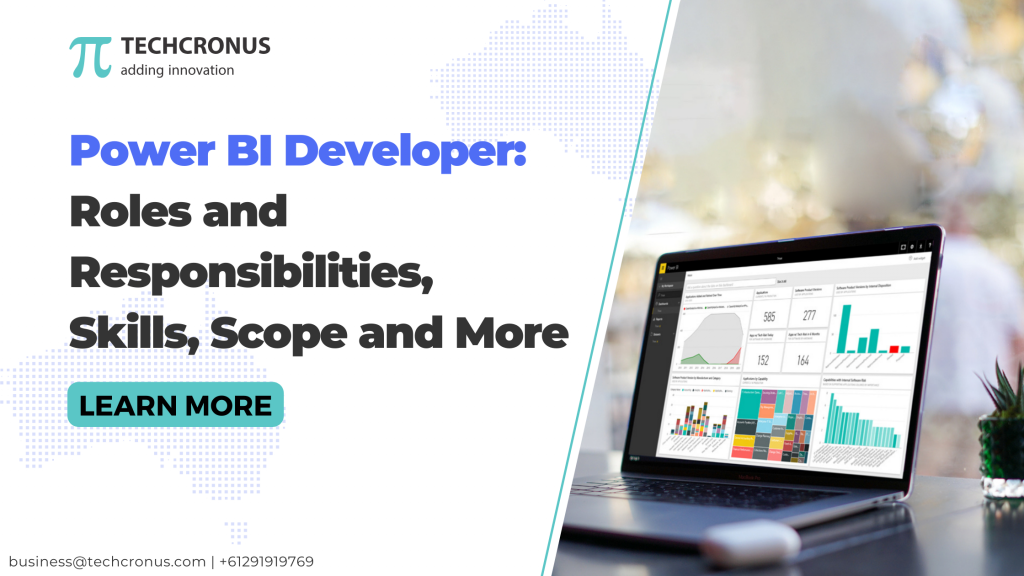Power BI Developer: Roles and Responsibilities, Skills, Scope and More
According to recent research, the global business intelligence market is projected to grow from $23.1 billion to $33.3 billion by the end of 2025. This growth reflects the rapid expansion of the business intelligence sector, ultimately driving an increased demand for Power BI Developer.
While Power BI is often lauded for its remarkable benefits, the role of the Power BI Developer remains somewhat elusive. Hence, we’ve undertaken the task of creating a comprehensive blog that serves as a definitive guide, providing insights into all facets of the Power BI Developer role. This blog will delve into the responsibilities, necessary tools, certifications, and essential skills required for Power BI Developers.
Moreover, we aim to shed light on the significance and impact of hiring Power BI developers, as this decision can profoundly influence whether your business thrives or flounders.
Let’s dive in!
What is a Power BI Developer?
A Power BI developer is a professional responsible for creating, managing, and optimizing business intelligence solutions using Microsoft Power BI. They possess expertise in data analysis, visualization, and reporting, leveraging Power BI’s features to transform raw data into actionable insights. Their roles often include designing data models, developing dashboards and reports, implementing data transformations, and collaborating with stakeholders to understand and address business requirements. Additionally, they stay updated with the latest Power BI features, tools, and best practices to continuously enhance their solutions and drive business success.
What are Power BI Developer’s roles and responsibilities?
The roles and responsibilities of Power BI Developers can vary depending on the organization’s needs. Some companies may hire Power BI Developers to design and develop Power BI reports, while others may enlist their expertise to improve decision-making processes. Other essential skills for Power BI Developers include a deep understanding of business intelligence, databases, BI tools, and related technologies.
Power BI Developer roles and responsibilities:
- Design and develop Power BI reports and dashboards.
- Collaborate with stakeholders to understand business requirements and translate them into data visualization solutions.
- Create and maintain data models within Power BI.
- Perform data cleansing, transformation, and manipulation to ensure data accuracy and reliability.
- Optimize report performance and data refresh schedules.
- Implement security measures to ensure data confidentiality and integrity.
- Conduct troubleshooting and debugging of Power BI solutions.
- Stay updated with the latest Power BI features, tools, and best practices.
- Provide training and support to end-users on Power BI usage and functionalities.
- Collaborate with data engineers and data architects to ensure seamless data integration.
- Customize and extend Power BI functionality using DAX (Data Analysis Expressions) and M language.
- Develop custom visuals and plugins to meet specific business requirements.
- Perform data analysis to identify trends, patterns, and insights.
- Document data sources, data models, and report specifications.
- Create and maintain data pipelines for automated data extraction, transformation, and loading (ETL) processes.
- Conduct performance tuning and optimization of SQL queries and data retrieval processes.
- Participate in cross-functional teams to drive data-driven decision-making across the organization.
- Evaluate and recommend improvements to existing Power BI solutions.
- Ensure compliance with data governance policies and regulations.
- Continuously seek opportunities to innovate and improve Power BI solutions to meet evolving business needs.
In summary, a Power BI Developer is responsible for all aspects related to Power BI.
Now, let’s discuss the essential skills required for a Power BI Developer.
Power BI Developer Skills:
For starters, one of the most crucial skills for a Power BI Developer is proficiency or familiarity with data science, business intelligence, and data analytics. They must also be adept at data integration, data warehousing, modeling, and presentation techniques and concepts.
Essential Power BI Developer Skills:
Experience with BI Tools:
Proficiency in using BI tools is invaluable. Power BI Developers should have hands-on experience in building rich dashboards, writing DAX expressions, and implementing security measures.
Experience in Data-specific Roles:
A minimum of 2-3 years of experience in data-specific roles is essential. This includes familiarity with database management, SQL querying, data modeling, and Online Analytical Processing (OLAP).
Familiarity with Microsoft BI Stack:
Knowledge of the Microsoft Business Intelligence stack, including Power Pivot, SSRS, SSIS, and SSAS, is advantageous. Many organizations rely on Microsoft services and products, making a well-informed Power BI Developer highly desirable.
Essential Non-technical Skills for a Power BI Developer:
Analytical Thinking:
- Ability to analyze complex data sets and derive meaningful insights.
Problem-solving:
- Aptitude for identifying issues and devising effective solutions.
Communication Skills:
- Clear and concise communication is crucial for conveying insights to stakeholders.
Collaboration:
- Capacity to work effectively in cross-functional teams and collaborate with stakeholders from various departments.
Attention to Detail:
- Precision in data analysis and report creation, ensuring accuracy and reliability.
Adaptability:
Flexibility to adapt to evolving business needs and technological advancements in the field of business intelligence.
By honing both technical and non-technical skills, Power BI Developers can effectively leverage Power BI to drive data-driven decision-making and enhance business performance.
